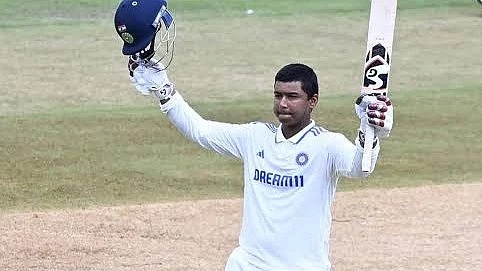India has good reason to be pleased with the outcome of the latest United Nations-led Doha meeting on handling challenges in Afghanistan. The June 30-July 1 conference in Qatar’s capital attended by the envoys of 26 countries, including India, is bound to speed up the recognition of the Taliban regime — and that suits us eminently! As the Taliban inch toward recognition, their confidence will get a big boost helping Kabul to look Islamabad in the eye instead of blinking in the ongoing Afghanistan-Pakistan confrontation.
To be honest, the uglier and bloodier Islamabad-Kabul conflict turns, the better for New Delhi. From that perspective, Doha III is definitely a morale-booster for the Taliban and, therefore, augurs well for India. Things are indeed progressing favourably for us in Afghanistan at Pakistan’s cost, and one can well imagine the sense of relief and satisfaction in our diplomatic establishment which has managed to put the worst behind it and march on.
India was represented at Doha III by J P Singh, Joint Secretary in the Ministry of External Affairs heading the Pakistan-Afghanistan-Iran division. Singh is, no doubt, the linchpin of New Delhi’s Afghan outreach; he travelled to Kabul in March too for parleys with the Taliban top leadership. But, intriguingly, External Affairs Minister S Jaishankar, too turned up in Doha on June 30, ostensibly to meet his counterpart, Mohammed bin Abdulrahman bin Jassim Al Thani. Jaishankar’s post on X said that they “reviewed our bilateral relationship focusing on political, trade, investment, energy, technology, culture and people-to-people ties”.
But I think that considering India’s high stakes in Afghanistan in the current scenario, Jaishankar’s presence in Doha on June 30 was no coincidence. It definitely had something to do with Doha III — as it certainly did with the repatriation of an ex-Indian Navy officer stranded in Doha. A few months ago, Qatar had released eight former Navy personnel who were earlier tried and sentenced to death for reportedly spying for Israel. While seven of the pardoned men were allowed to return to India from the death row where they were languishing, the eighth is yet to come back — and Jaishankar is obviously trying his best to somehow bring him home.
A pragmatic India is quietly doing business with the Taliban and backing them in our national interest. And the Taliban are on a firmer footing post Doha III which is good for us. The improvement in their status is all too evident. They were not even invited to the UN-sponsored Doha I in May 2023. They received an invitation to the second edition, or Doha II, in February this year but they set unacceptable conditions for attending it, including demands that Afghan civil society members, particularly women representatives, be excluded from the talks and that the Taliban be treated as the country’s legitimate rulers.
The Taliban stuck to their guns and took part in the third conference or Doha III on their own terms. The organisers excluded representatives of civil society and women’s rights groups to ensure the participation of the Taliban. The Taliban also insisted that the UN must stop labelling them as a terrorist organisation to create a positive, genial and constructive atmosphere for talks. Afghanistan’s new rulers who seized power in 2021 agreed to send a delegation only after all their conditions were met by the organisers, particularly UN Secretary-General Antonio Guterres, paving the way for their participation.
At Doha III, the Taliban were clearly in ‘attack’ mode. On the eve of the meet, senior Afghan Foreign Ministry official Zakir Jalaly had warned that the Taliban government delegation would highlight “financial and banking sanctions” and the “threat” these pose to Afghanistan’s economy without mincing words. Addressing 25 foreign envoys and top UN officials, Zabihullah Mujahid, head of the Taliban delegation, fired an opening volley at the world. “Afghans are asking why they are being ganged up on, on the basis of unilateral and multilateral sanctions,” he thundered as he questioned whether the sanctions still targeting Afghanistan were “fair practice” after “wars and insecurity for almost half a century as a result of foreign invasions and interference”.
The world is probably still in a dilemma over its approach to Afghanistan and is wrestling with doubts and hopes to strike the right balance. But an assertive and questioning Taliban is very good news for India. A self-confident and forceful Taliban not afraid to speak its mind wouldn’t be a pushover for Islamabad or Beijing who pose the biggest threat to Indian interests in Afghanistan. If the Taliban can stand up to China and Pakistan and show them their place with the same self-belief that they displayed at Doha III, it would be a crucial strategic and operational gain for India in the immediate, intermediary and long term.
Doha III has also gifted India a golden opportunity to do the United States a favour. A meeting held on its sidelines between Washington and Kabul to secure the release of two American nationals jailed in Afghanistan didn’t make much progress. Amid the stalemate, Mujahid openly said that the US must accept our conditions if it wants to free its citizens. The US side is so embarrassed by its failure that all it would say is that they had “raised the issue”. New Delhi, which now has a presence in the war-ravaged country, should mediate between Washington and Kabul so that the two US nationals are freed in exchange for let’s say 10 Afghan prisoners in American jails. Such a deal would do us proud and ingratiate us with the world’s richest country as well as one of the world’s poorest nations.
The author is an independent, Pegasused reporter and commentator on foreign policy and domestic politics










